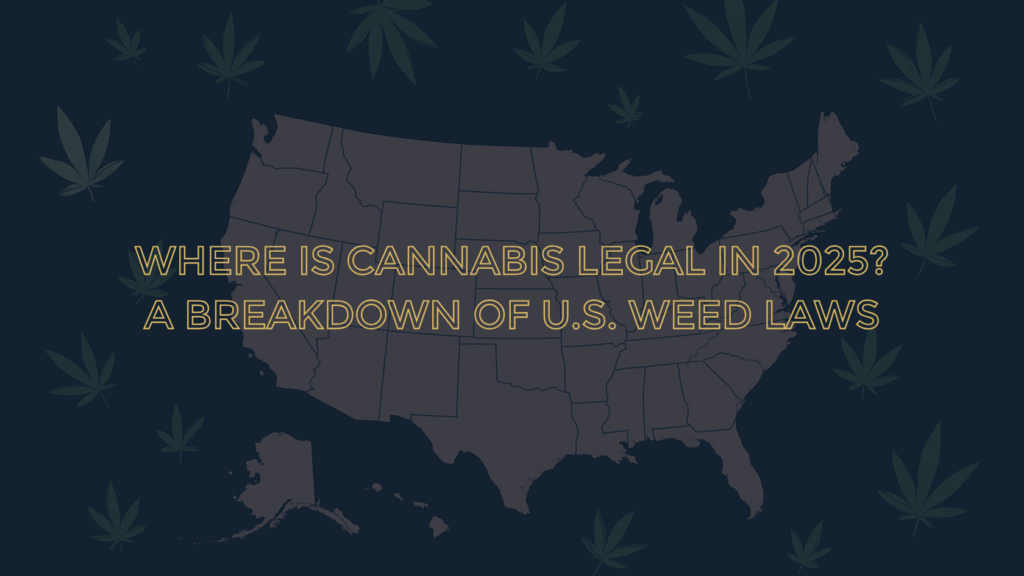
Cannabis laws have come a long way. But in 2025, the U.S. is still a patchwork of different rules. Depending on your zip code, weed might be fully legal, medical-only, available as hemp-derived THC, or still completely banned.
If you’ve been wondering “Where is cannabis legal in 2025?” or trying to keep up with new state-by-state marijuana laws, this article breaks it all down.
Plus, we’ll look ahead at the biggest legal changes in the works at both the state and federal levels.
States Where Cannabis Is Fully Legal (Adult-Use + Medical)
In these states, adults 21 and over can legally buy and use cannabis for recreational or medical purposes. As of early 2025, 24 states (plus DC) have legalized weed for adult use. These states include:
- Alaska
- Arizona
- California
- Colorado
- Connecticut
- Delaware
- District of Columbia
- Illinois
- Maine
- Maryland
- Massachusetts
- Michigan
- Minnesota
- Missouri
- Montana
- Nevada
- New Jersey
- New Mexico
- New York
- Ohio
- Oregon
- Rhode Island
- Vermont
- Virginia
- Washington
These states typically allow regulated dispensaries, personal possession, and home cultivation (with limits). They also tend to have stronger social equity programs and expungement efforts to undo the harms of past cannabis convictions.
If you’re looking for a legal weed states map in 2025, these are your “green” zones.
Not bad, huh? Almost half of US states have fully legalized cannabis since 2013. It may be slow, but that is progress!
Medical Marijuana States Only
Some states still limit cannabis access to registered patients with qualifying conditions. These medical marijuana states include:
- Alabama
- Arkansas
- Florida
- Georgia (CBD only)
- Hawaii (decriminalized but highly restricted)
- Indiana (CBD only)
- Iowa (CBD only)
- Kentucky (CBD only)
- Louisiana (also decriminalized)
- Mississippi (also decriminalized)
- New Hampshire (also decriminalized)
- North Dakota (also decriminalized)
- Oklahoma
- Pennsylvania
- South Dakota
- Tennessee (CBD only)
- Texas (CBD only)
- Utah
- West Virginia
- Wisconsin (CBD only)
Programs vary drastically state-to-state. Some offer full-strength products at licensed dispensaries, while others allow only low-THC oils or CBD only. For example, Texas permits CBD oil with minimal THC for epilepsy patients, but no smokable flower is allowed.
States that have medical cannabis that have also decriminalized—while removing harsh punishments and prison time for possession—still do not have recreational cannabis access.
These states often represent the middle ground and are key battlegrounds for upcoming marijuana legalization updates. When combining this list with our previous list of fully legal states, it turns out that almost the entire country has either recreational or medical cannabis access.
But there are still a few holdouts.
States Where Cannabis Is Still Illegal
On the bright side, this list is the smallest of them all. In 2025, only a small handful of states still completely ban cannabis in all of its forms.
These states include:
- Idaho
- Kansas
- Nebraska
- North Carolina
- South Carolina
- Wyoming
Every state on this small list shares at least one border with a state that has medical or recreational cannabis. Many states are pushed into action when their citizens begin crossing state lines to purchase cannabis products, showing the demand exists.
However, in many states where only medical cannabis is available, consumers have found a new form of “legal” cannabis: Intoxicating hemp.
The Rise of Intoxicating Hemp
In 2018, the US government passed the Farm Bill, a comprehensive agricultural bill aimed at helping farmers across the country. Included in this bill was a new addition, which federally legalized industrial hemp.
The language of this bill specified that hemp is any part of the cannabis plant that contains less than .3% Delta 9 THC on a dry weight basis. Which means any other chemical in cannabis is fair game.
This led to creation of new “alt-cannabinoids” like Delta-8 THC, THC-O, HHC, and others through chemical conversion processes. Now you can find “legal” hemp products in most states that get you high, despite not technically being considered cannabis.
At first glance this looks like a great loophole that gives consumers access to the legal cannabis they’ve always wanted. However because the entire intoxicating hemp industry operates within a loophole, there is no actual regulation surrounding these products.
About 18 states have either completely banned or highly restricted access to intoxicating hemp products. In the majority of other states however, it’s like the wild west.
If you want to read up on the pros and cons of intoxicating hemp, check out this article breaking it all down.
What’s Happening Now: Federal and State-Level Legislation
While the feds have dragged their feet for years, federal cannabis reform in 2025 is looking optimistic.
Federal Moves:
Rescheduling Cannabis: The Department of Health and Human Services has recommended moving cannabis from Schedule I to Schedule III. If the DEA approves, it could unlock more medical research and tax benefits for cannabis businesses. However this rescheduling was meant to happen last year, and the DEA has not been upfront about their process.
SAFE Banking Act: This bill would allow legal cannabis companies to use banks and access loans. It has bipartisan support and could finally pass this year. This bill has gone through the legislature several times going back to 2018.
- STATES 2.0 Act: The Strengthening the Tenth Amendment Through Entrusting States (or STATES) Act would amend the Controlled Substances Act (CSA) in a way that would prohibit federal criminalization of people acting in compliance with state cannabis programs, as well as those operated by Indian tribes. Long story short, this bill will federally legalize cannabis, explicitly in states that have already legalized at the state level.
The STATES 2.0 bill is the talk of the town at the time of this writing (May 2025), as it appears to be a bipartisan bill with solid support. However, only time will tell if it can really make it through the legislature and into law.
State-Level Action
State level cannabis legislation can move rapidly, with very little public notice or influence. Many states do not allow citizen-led initiatives to create laws, and instead require the legislature to do so.
Organizations like Marijuana Policy Project (MPP) are an essential resource for learning about what is happening in your state in regards to cannabis. You can check their dedicated page to state-specific legislation and see if your state has anything on the ballot this year.
One way you can get involved in the cannabis movement in your state is by writing your representatives. While it may sound like a waste of time, you would be surprised how big of an impact your voice can have.
In Colorado for example, the state recently tried to pass a bill that would have restricted the industry so heavily as to nearly destroy it all together. With millions of dollars in backing from prohibitionist groups, the industry was up against a giant.
With the support of thousands of industry workers and cannabis consumers writing their representatives, the bill was shut down before it even made it through committee.
The government may be signing bills into law, but that doesn’t mean you can’t influence those bills, especially in your home state.
FAQ: Cannabis Laws in 2025
Want the short and sweet around some of the most common questions about cannabis laws in 2025? Check out our FAQs below, and let us know if you have a question by getting in touch with us!
Is weed legal in all 50 states?
Nope. As of 2025, fewer than half of U.S. states have fully legalized recreational cannabis. A smaller group allows only medical use, and a handful still ban all forms of cannabis.
Can I buy intoxicating hemp legally?
That depends on your state. While delta-8 is federally legal under the 2018 Farm Bill, several states have passed laws banning or regulating it.
What is the status of federal cannabis legalization?
Cannabis is still federally illegal, but rescheduling efforts and bills like the SAFE Banking Act could create major changes in how cannabis is handled nationwide.
Can I travel with cannabis between states?
Even if cannabis is legal in both states, crossing state lines with cannabis is still federally illegal. This includes air travel and driving. Some airports in legal states allow you to surrender cannabis without penalty, but always check local policies, and don’t assume reciprocity between state programs.
Is it legal to grow cannabis at home?
Home cultivation laws vary by state. Some fully legal states allow adults to grow a limited number of plants (e.g., 6 per person in California), while others restrict growing to medical patients only or ban it altogether. Always check your state’s regulations before planting anything.

